A full service digital marketing agency and web design firm located in Scottsdale, Arizona.
1-877-347-3376
Email: info@spmarketingexperts.com
SP Marketing Experts
9903 E. Bell Rd., Suite #120-B Scottsdale AZ 85260
The coronavirus (COVID-19) pandemic has altered the state of business across the world. Not only has world economies taken a significant downturn in recent weeks, but countless state governments in cohesion with the federal government have enacted orders to limit human travel and interaction.
This results in less sales opportunities, especially for brick-and-mortar businesses. Any person will tell you that less business should automatically result in a dial back of related marketing services.
However, this situation is different. Businesses absolutely have to stay running to prevent a colossal worldwide market collapse. With this being the case, you should definitely reconfigure your marketing strategy.
Read this guide to discover 15 clever changes you can make to your marketing strategy in these difficult times.

Should I Continue With My Marketing Strategy?
These are difficult times we are living in. Hence, many business leaders are second-guessing their marketing strategies and wondering if they should move forward. Rightfully so, the COVID-19 virus is a serious matter.
This doesn’t mean that you should halt your business completely if you don’t have to. People need common goods and services now more than ever, and it’s your responsibility as a business to provide these items.
Also, many people want to continue on with their normal lives, which include making online purchases, taking part in repairs around their home, and staying healthy. While the COVID-19 virus has the world at a stand-still, the demand for business hasn’t stopped.
Though, you should adjust your marketing strategy to reach people who have adapted their lives during this pandemic.
1. Alter Your Content Marketing Strategy
Just because the COVID-19 is still a major dilemma doesn’t mean you have to neglect your content marketing initiatives. Creating high-quality content is still the crux of every marketing strategy, whether you’re producing an e-book for your email list subscribers or crafting blog articles.
During any time, a successful content marketing strategy entails creating relevant articles. In today’s climate, the COVID-19 is the most relevant topic available. This doesn’t mean you have to create content that only talks about the coronavirus, but it does mean you should discuss ways how the illness affects your business.
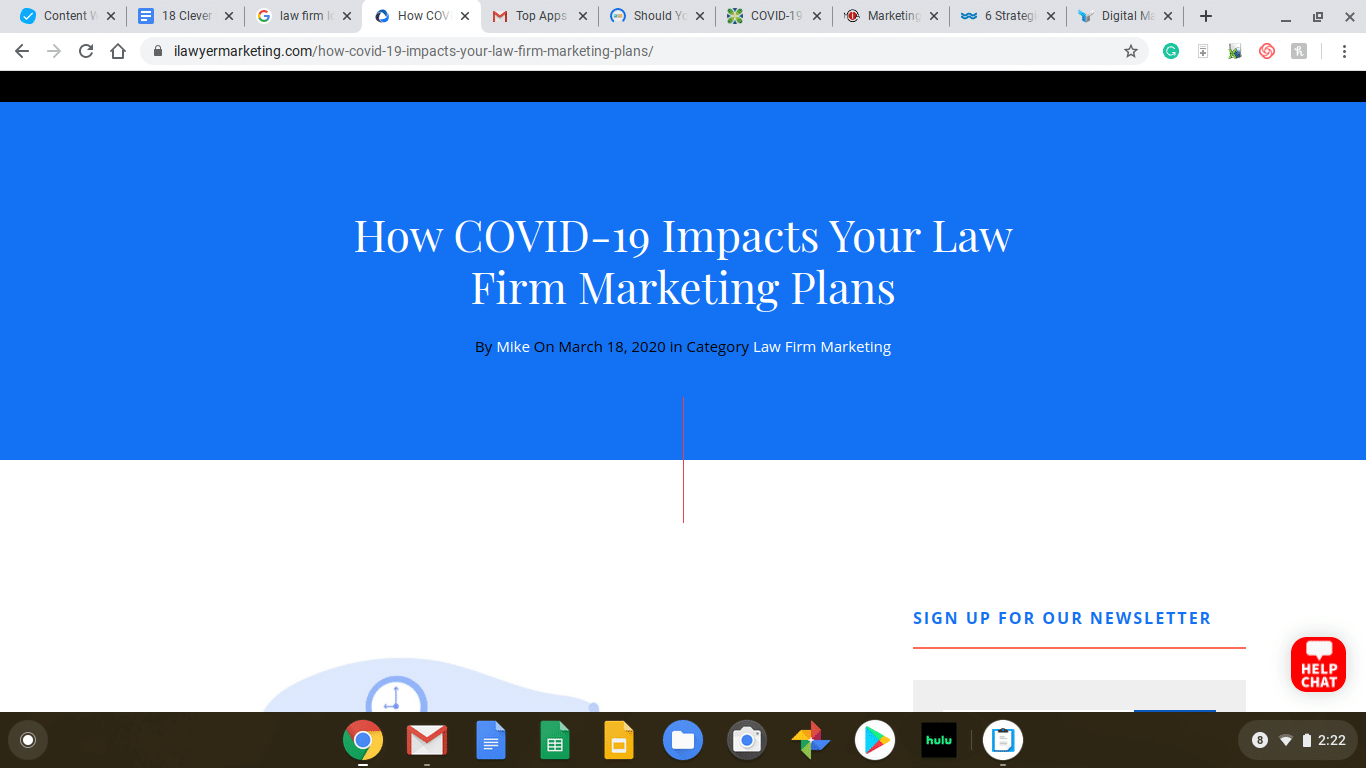
Just check out how this legal marketing firm developed a blog topic surrounding the coronavirus.
This article would clearly be of use to law firms that need direction in revamping their marketing plans. In the same way, you can create content that’s useful for your audience. If your business or your clients’ business has changed because of the coronavirus, then create content that will help them through a difficult and confusing time.
2. Show Ways You Are Fighting the Coronavirus on Social Media
Many people are currently out or work, which means most are spending their time on social media platforms like Facebook, Instagram, and Tik-Tok. This presents the perfect opportunity to continue your social media marketing strategy.
Ideally, you should run a philanthropic campaign to show potential customers how you are fighting the coronavirus. In an effort to unite collective efforts to fight the COVID-19, Google published a video on Twitter.
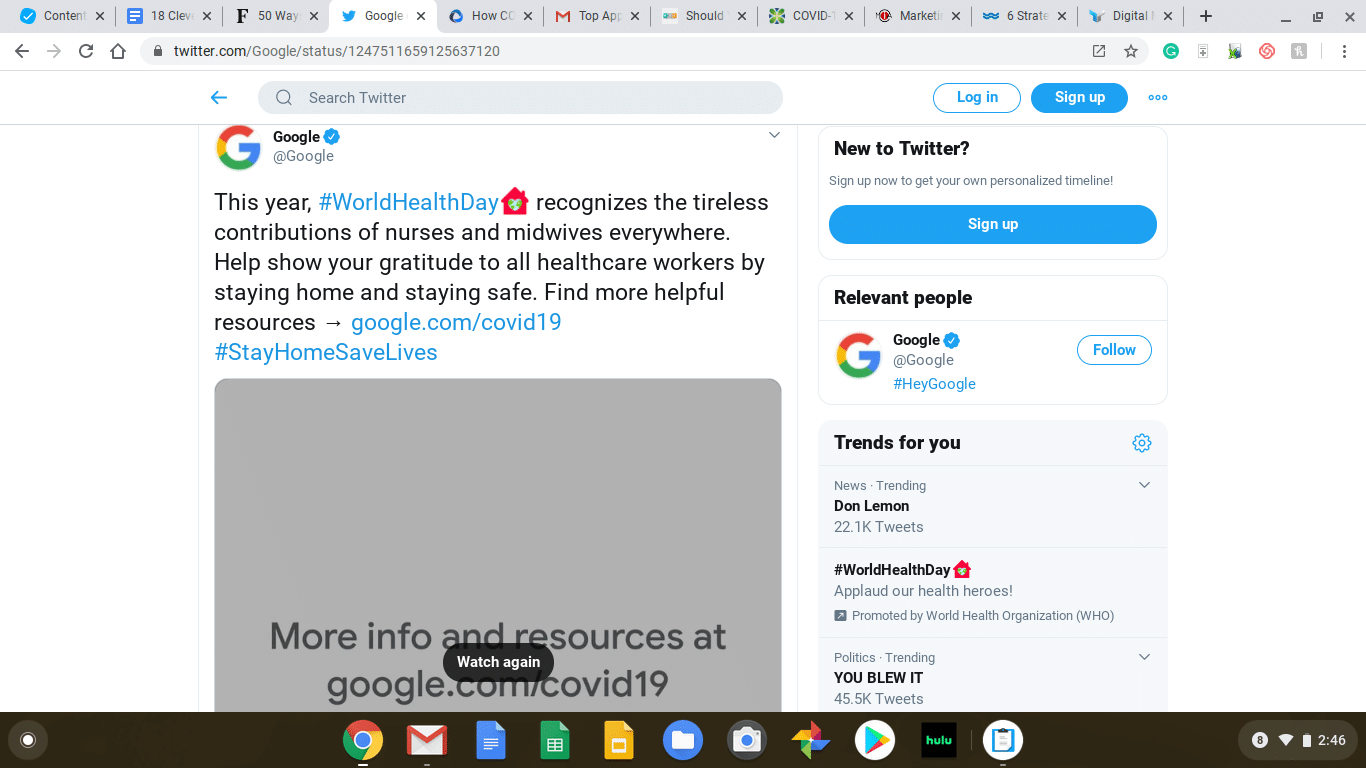
The purpose of this video is to not only recognize the tireless efforts of nurses and midwives across the world, but it also informs people of how they can join the fight through a provocative video.
Posts like this should be the basis of your current social media marketing campaign. The COVID-19 is a sensitive topic, and if you can provide value about how you’re helping, you can build brand awareness and make a difference in the world.
3. Update Your Google My Business Profile
If you run a local business, you should update your Google My Business (GMB) profile if there are any changes to your company, such as closures and truncated business hours. One of the most frustrating things a person can go through is visiting a business that’s actually closed despite their GMB profile listing that they are open.
It also doesn’t help if your GMB profile says that “hours or services may differ.
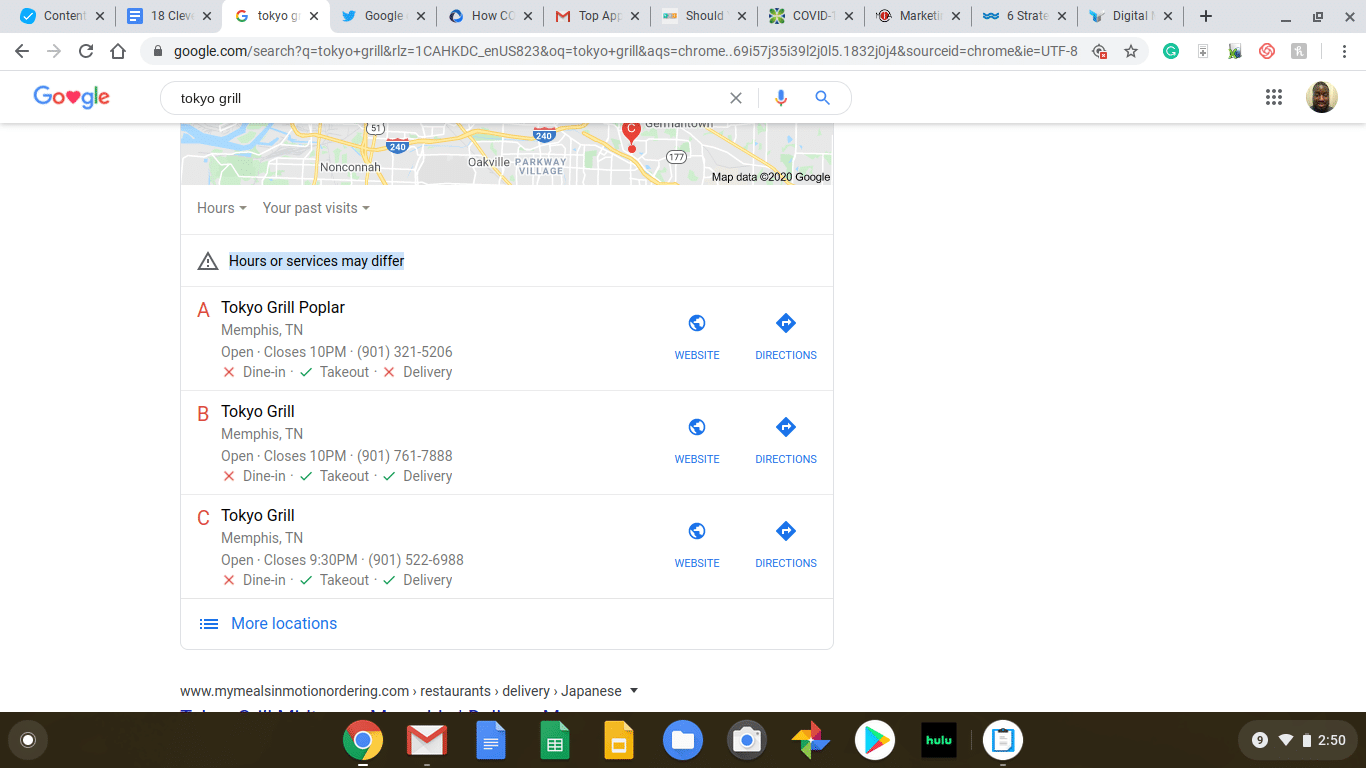
This notice doesn’t help anyone, nor give them any updated information on the state of your business. It’s absolutely important that your GMB profile is accurate at all times. Ignoring this can make potential customers irritated and less likely to work with you in the future.
Therefore, keep your business hours clear and make sure you let web users know if your physical location is completely closed.
4. Avoid Insensitive Emails
Because of the COVID-19 viruses, thousands of people in the United States have been affected and may have unfortunately died. It’s important to realize that this virus is not a laughing matter, nor is it a time to carelessly advance your business.
Granted, you are still allowed to continue with your email marketing strategy. Though, be careful of sending insensitive emails to your audience. An example of this is continuing on with sales emails in the middle of this crisis.
Although this may seem like a harmless business tactic, it can be misconstrued by your target audience. If you want to know the right way to move forward with your emails, check out this example from Draper James.
Though no one can know for sure, this email is highly-personal and looks like it was written by Reese Witherspoon herself. The best part of this email was that Witherspoon asked her audience if it was okay to show off her company’s new spring collection.
Emails sent with empathy and an understanding of the difficulties people are experiencing during this time are highly-effective. Acting like nothing is going on by continuing with your normal email marketing strategy will ultimately lead to your emails getting ignored.
That can also result in people unsubscribing from your email list if you aren’t providing content that’s relevant to them. Think about the type of emails you would want to receive during a health crisis and make sure you double-check everything before you schedule any emails.
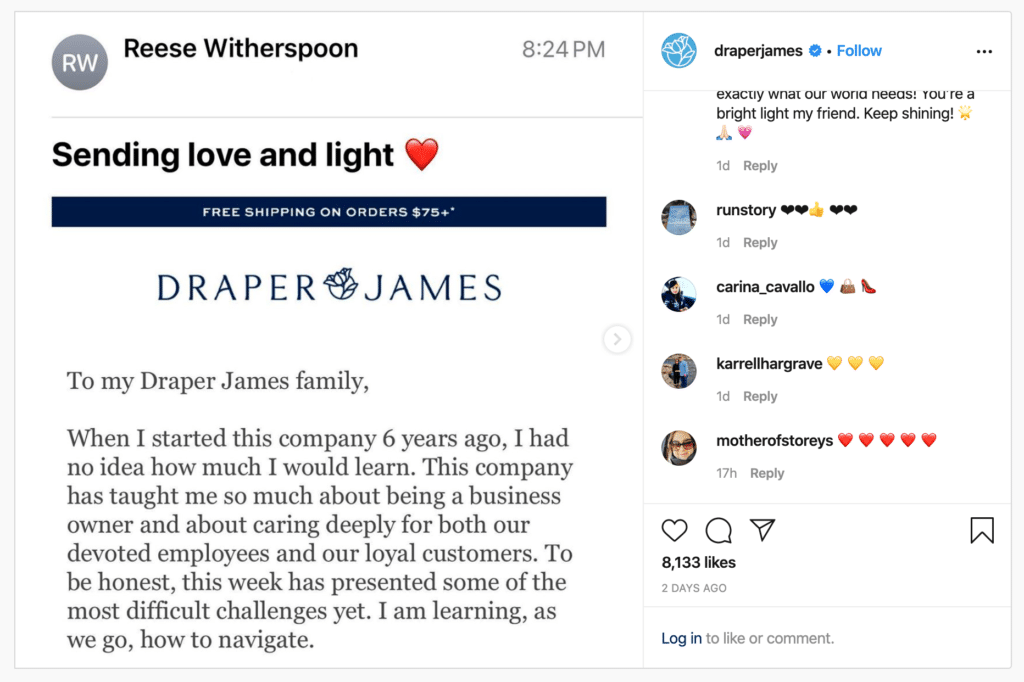
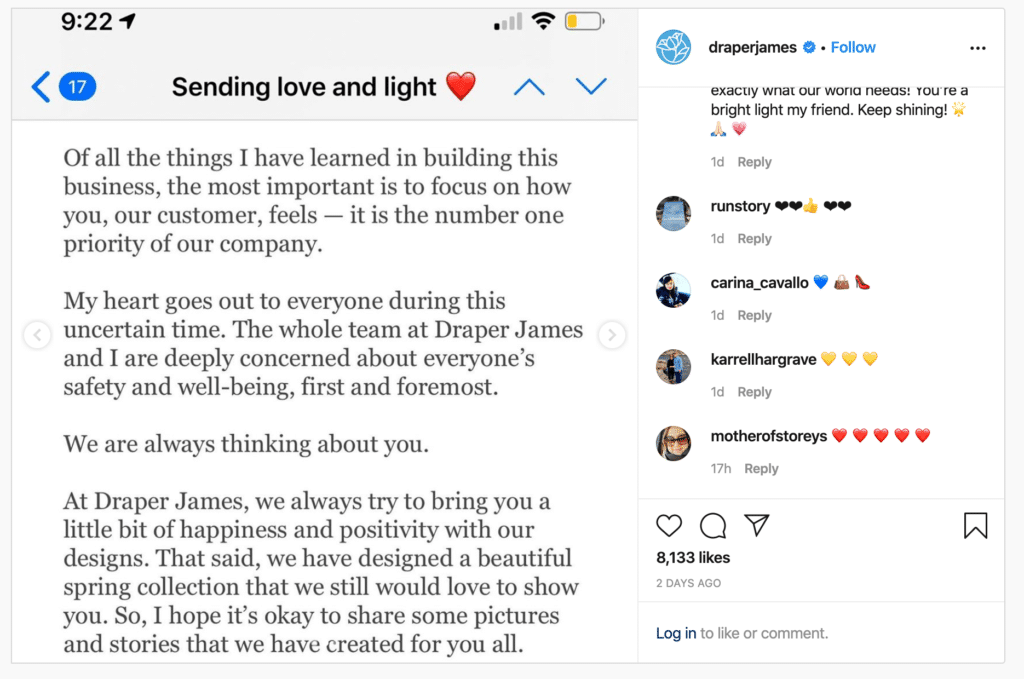
5. Limit Non-Essential Marketing Tasks
Less business means less revenue for all types of businesses. Even billion-dollar companies like Google and Amazon have been affected financially by the coronavirus. If your business is experiencing a shortage of incoming funds, then you have to make budget cuts somewhere.
Essential marketing strategies like SEO, content creation, and email marketing are off-limits if you want your business to stay afloat. Nonetheless, that doesn’t mean that all marketing tasks aren’t fair game.
If you have a complete digital marketing campaign in place, sever ties with tasks that aren’t necessary at the moment. This includes tasks such as:
- Link-Building: Link-building is one of the best ways to enhance your online presence and build more online revenue. It takes a tremendous amount of time and effort to carry out successful link-building campaigns. Therefore, dial back this campaign or eliminate it altogether for the time being.
- PR & Outreach: If you’re trying to set up a partnership or engage with the public somehow, you should probably save this strategy for another time. Not only are most people at home, but businesses are rapidly losing money. It’s not an ideal time to pursue any partnerships.
- Cease TV Commercials: If your business has any television commercials still in rotation, it would be wise to halt them to save more money during this time. Since most states are requiring people to stay at home, hosting commercials that are advertising your business’ physical location isn’t a smart move.
6. Adjust Your PPC Strategy
Google has now altered their PPC policies to navigate advertisers in the right direction of creating regulated ads. According to these policies, advertisers are prohibited from mentioning the coronavirus, unless they are healthcare organizations with a goal of disseminating helpful information about the virus.
Google has created this measure to prevent fraudulent businesses and individuals from producing ads that will help them profit from the COVID-19 virus. Before you move forward with your PPC strategy, make sure that your ad copy and images are within the guidelines of this new policy.
To learn more about Google’s ad policies regarding the coronavirus, click here for more information. Google isn’t the only advertising platform that has reformed their policies. Twitter, Facebook, and even Tik-Tok have made reforms to reduce illegitimate advertising practices.
To avoid stringent consequences from these platforms, make sure you are following their guidelines for creating and submitting ads.
7. Provide Relaxing Content on Social Media
With millions of Americans at home, social media has become a popular pastime. Funny memes and videos have for a long time been treasured by consumers, and many businesses have caught on to adapt these posts to their own social media campaigns.
Just take a look at how Chik fil A uses a Facebook post to simultaneously entertain their audience and convince them to buy their products.
If you’re going to keep your social media marketing strategy going, then make sure you are providing content that’s engaging to your audience. Even in times like these, people still want to be entertained.
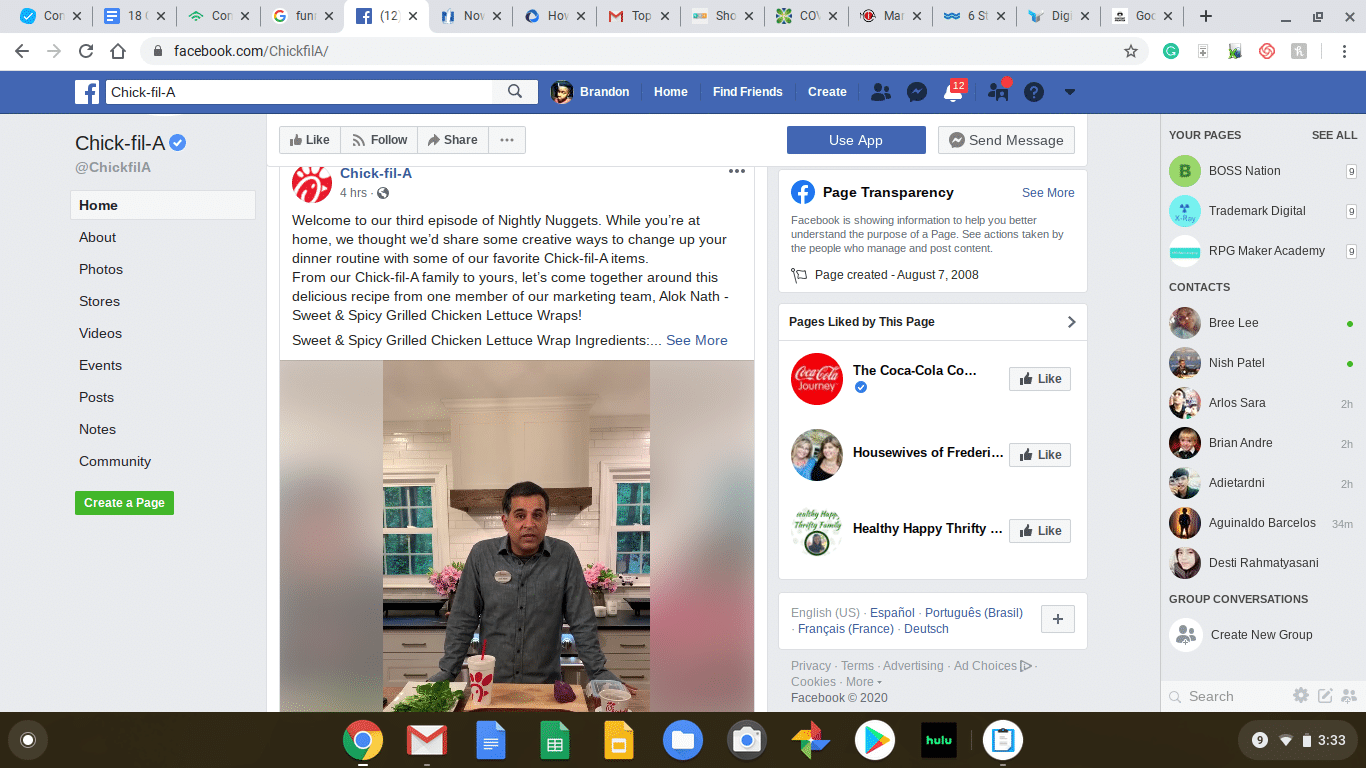
8. Avoid Making a Joke about the Coronavirus
In the previous section, we maintained that you can create relaxing content related to the coronavirus. That isn’t to say that you should make inflammatory and insensitive jokes about the virus.
One jewelry company in Australia received a lot of negative attention for making this joke in poor taste.
As more and more people get infected with the COVID-19 virus and lose their lives, posts like this begin to become unacceptable. In fact, you shouldn’t resort to tactics like these to gain attention.
Oftentimes, many businesses are oblivious about the messages they send through their marketing channels until it’s too late. Don’t fall into the trap of making hasty decisions with the content you decide to create.
Instead, instruct your marketing team to double-check all marketing content to ensure that nothing can be taken as offensive by your target audience. Doing so will help you avoid losing touch with potential customers and receiving negative attention from the press and social media.
Remember, no matter large or small your marketing channels are, people are always watching what you push out.

9. Avoid Playing on People’s Fears
Many industries have been affected by COVID-19. This mainly includes aviation, hospitality, oil and gas, and automotive industries. Many businesses are losing money at a concerning rate, causing them to use this sense of urgency to sell more products and services.
Taking it a step too far, some businesses use scare tactics to increase their profits. For example, manufacturers of first-aid kits often use messaging like “last one left!” or “don’t put your family’s health at risk” to promote their products.
This is frankly not the way you should do business. Ultimately, you can’t force or scare people into purchasing your products. Instead, you can create content that informs your audience of how to be proactive in buying the products they need.
Make sure that the tone and angle of your marketing content relates to the pain points and concerns of your target audience, without profiting from their anxiety. There is a large amount of false information currently being spread about the coronavirus.
It would damage your reputation to dilute your marketing strategy with messages that prompt potential customers to fear and rush to purchase something.
10. Reassure Your Customers That You’re Prioritizing Their Health
If you’ve been out in public lately, you may have noticed droves of people wearing masks and gloves. Fears of being infected with the COVID-19 virus are prevalent, and potential customers will not hesitate to avoid your business if they don’t believe you’re prioritizing their health first.
To avoid this, make sure you are sending emails to all of your subscribers indicating the measures you’re taking to sanitize and keep your building clean. Here is a great example of how to do this.
This email cites authoritative health information and effective sanitization practices Rent the Runway uses to ensure that their business is safe for everyone. Following their lead with these types of emails can encourage more visits to your business.

11. Focus on Remarketing Campaigns
With a lot of free time on your hands, you can finally put your full focus on remarketing campaigns if you haven’t already. Per Barilliance, more than 75% of online shoppers will abandon their shopping carts.
With more people browsing online, it’s now time to re-engage these cold leads and convert them with lucrative deals such as, “free shipping” and special promos. Here is an example of how you can get this done with your business.
This is an ideal opportunity for healthy delivery and at-home fitness services.
In addition to attracting more qualified leads to your website, you can drive more sales by using Facebook to reconnect with people who have interacted with ads. This also includes remarketing to potential customers that have commented on, liked, and shared your content on Facebook and Instagram.
Remember that the more relevant your content is, the better your engagement will be for your campaign. Remarketing during COVID-19 is ideal for businesses targeting people who are staying at home.
By providing engaging content, you can drive increased traffic and handle unfinished business with cold leads.

12. Try Facebook and Instagram Live
Local businesses are experiencing significant losses now more than ever. It’s recommended that these businesses shift their marketing strategy to stop the bleeding and prevent more losses.
Getting creative with your marketing strategy is crucial in these difficult times, and Facebook and Instagram Live are perfect options for reaching new audiences. Using live video, you can connect with audiences in a genuine and real way.
After all, effective live video methods can result in three times as many engagements than pre-recorded videos. Fortunately, all you need is a phone to get started and record your live videos.
Potential customers that are practicing social distancing and isolation habits will naturally crave face-to-face interaction. This is a normal part of life, and while live video isn’t technically real interaction, it’s the only feasible alternative.
Try offering demos, answering questions, conducting webinars, and more to keep your audience engaged and show them what you have to offer. People now want to experience the normality of working with businesses that they can see.
Live video provides the amazing opportunity to get close and personal with your target audience.
13. Be Willing to Pivot
Many businesses and professionals in a wide variety of industries are being forced to postpone and cancel their events. If you have been forced to do the same or are currently making a decision, make sure you practice flexibility to best assist your customers.
This may entail changing a live conference event to a virtual call instead of cancelling it. If you have planned a workshop or conference, pivot accordingly to keep your customers and leads interested.
It’s important to respect the wishes of all of your customers. If you have to make a decision whether to postpone or cancel an event, some customers may want a full ticket refund and others may not mind.
Siding the majority in either case can be disastrous, as people are being affected differently by the COVID-19 virus and their needs must be addressed as such. Service providers have already begun to pivot to avoid friction with customers that are unwilling to pay for necessary goods.
Geico has already suspended the cancellation of insurance plans due to non-payment.
On a smaller scale, you can also pivot your offerings to be flexible to your customers without going this far. Here is how a personal trainer adapted their services to the issue of the COVID-19 virus.


14. Make Your Digital Presence Stronger
Your website remains the online headquarters of your business and center of your digital presence. If you’re going to continue on with your marketing strategy, then your website must be enhanced to meet the growing demand of business from people with limited access to your physical location.
The best way to make your digital presence stronger is by refining the use of chat boxes on your site. Many websites use chatboxes that don’t employ the use of live support agents. Instead, these chat boxes prompt users to send a message that may receive a response in a few hours.
To eliminate this friction, go all-in on making your chat functionality more enhanced to service as many customers and leads as possible. Also, create efficient guidelines for your customer support team.
You may receive more calls now than what you’re used to from people who are in a state of panic and those who may have questions about your business. Therefore, make the necessary preparations to accommodate an increased influx of customers who may not be able to visit your business’ location.
15. Adjust Your Budget
At the end of the day, certain business operations will have to be cut to save money. Unfortunately, this may involve some essential marketing tasks. In these times, make sure that your marketing strategy is air-tight and is not losing money.
This means avoiding experimentations and sticking to what works for now. Once you have trimmed your marketing budget, make the adjustments to make other important marketing tasks work.
Although you may have limited financial resources to spearhead content marketing and SEO key performance indicators (KPIs), use what you have to still put forth quality deliverables, even if it takes more effort.
Every organization across the world is making changes to their business to ultimately save money and salvage critical operations. Don’t get complacent in believing that your business is safe from these changes.
Adjust Your Marketing Strategy Today!
The COVID-19 virus hasn’t just altered the state of business, but it has changed the way marketing is supposed to traditionally work. Don’t get complacent and ignore changing your marketing strategy to adapt to these difficult times.
Instead, put forth all of the resources you have to revamp your marketing campaigns. With marketing being the impetus of sales and business, you can’t afford not to get started right now.
Reviews
I use SP Marketing for a number of things but I have to mention how useful it’s been having them help with Google Pay per click management. This company is fantastic at what they do. They are on top of everything and they are always so professional. I really don’t know what I would do without them. If you need any kind of digital marketing help this is the first place I would recommend. They put a lot of emphasis on customer care and they have really helped my business grow.
We hired SP Marketing to run online and social media ads for our company. I wasn’t really sure what to expect but decided it was worth a shot. The uptick in sales has been wonderful. These guys really know what they’re doing and their ads have brought us so many new customers. I’m so thankful. I highly recommend them.
I just love SP Marketing Experts. I needed some major help with link and citation building and these guys were able to handle everything for me. Their services have been so useful. I can't remember the last time I worked with a company that had such great customer service. If you're looking for any kind of digital marketing help for your company this is the first and only company I would recommend.
SP Marketing helped us completely redo our website. The old one was such a mess and we needed so much help. The end result was modern, easy to read, and very user friendly. I couldn’t be happier with their services. They did such a great job for us. I would 100% recommend them to anyone who has a business and needs website or marketing help. They do a fantastic job. They really delivered for us.
In order to stay competitive as a business you have to be regularly posting on social media. However, I own a small business and managing my own social media while I’m trying to run a company isn’t really productive. Thankfully, I found SP Marketing. They have been great. They do all of our social posts for us so that I don’t have to worry about it. It’s really helped the business grow. They are very professional and very easy to work with. I don’t know what I did without them.
I use SP Marketing for a number of things but I have to mention how useful it’s been having them help with Google Pay per click management. This company is fantastic at what they do. They are on top of everything and they are always so professional. I really don’t know what I would do without them. If you need any kind of digital marketing help this is the first place I would recommend. They put a lot of emphasis on customer care and they have really helped my business grow.
We hired SP Marketing to run online and social media ads for our company. I wasn’t really sure what to expect but decided it was worth a shot. The uptick in sales has been wonderful. These guys really know what they’re doing and their ads have brought us so many new customers. I’m so thankful. I highly recommend them.
I just love SP Marketing Experts. I needed some major help with link and citation building and these guys were able to handle everything for me. Their services have been so useful. I can't remember the last time I worked with a company that had such great customer service. If you're looking for any kind of digital marketing help for your company this is the first and only company I would recommend.
SP Marketing helped us completely redo our website. The old one was such a mess and we needed so much help. The end result was modern, easy to read, and very user friendly. I couldn’t be happier with their services. They did such a great job for us. I would 100% recommend them to anyone who has a business and needs website or marketing help. They do a fantastic job. They really delivered for us.
In order to stay competitive as a business you have to be regularly posting on social media. However, I own a small business and managing my own social media while I’m trying to run a company isn’t really productive. Thankfully, I found SP Marketing. They have been great. They do all of our social posts for us so that I don’t have to worry about it. It’s really helped the business grow. They are very professional and very easy to work with. I don’t know what I did without them.
I use SP Marketing for a number of things but I have to mention how useful it’s been having them help with Google Pay per click management. This company is fantastic at what they do. They are on top of everything and they are always so professional. I really don’t know what I would do without them. If you need any kind of digital marketing help this is the first place I would recommend. They put a lot of emphasis on customer care and they have really helped my business grow.
We hired SP Marketing to run online and social media ads for our company. I wasn’t really sure what to expect but decided it was worth a shot. The uptick in sales has been wonderful. These guys really know what they’re doing and their ads have brought us so many new customers. I’m so thankful. I highly recommend them.
I just love SP Marketing Experts. I needed some major help with link and citation building and these guys were able to handle everything for me. Their services have been so useful. I can't remember the last time I worked with a company that had such great customer service. If you're looking for any kind of digital marketing help for your company this is the first and only company I would recommend.
SP Marketing helped us completely redo our website. The old one was such a mess and we needed so much help. The end result was modern, easy to read, and very user friendly. I couldn’t be happier with their services. They did such a great job for us. I would 100% recommend them to anyone who has a business and needs website or marketing help. They do a fantastic job. They really delivered for us.
In order to stay competitive as a business you have to be regularly posting on social media. However, I own a small business and managing my own social media while I’m trying to run a company isn’t really productive. Thankfully, I found SP Marketing. They have been great. They do all of our social posts for us so that I don’t have to worry about it. It’s really helped the business grow. They are very professional and very easy to work with. I don’t know what I did without them.
I use SP Marketing for a number of things but I have to mention how useful it’s been having them help with Google Pay per click management. This company is fantastic at what they do. They are on top of everything and they are always so professional. I really don’t know what I would do without them. If you need any kind of digital marketing help this is the first place I would recommend. They put a lot of emphasis on customer care and they have really helped my business grow.
We hired SP Marketing to run online and social media ads for our company. I wasn’t really sure what to expect but decided it was worth a shot. The uptick in sales has been wonderful. These guys really know what they’re doing and their ads have brought us so many new customers. I’m so thankful. I highly recommend them.
I just love SP Marketing Experts. I needed some major help with link and citation building and these guys were able to handle everything for me. Their services have been so useful. I can't remember the last time I worked with a company that had such great customer service. If you're looking for any kind of digital marketing help for your company this is the first and only company I would recommend.
SP Marketing helped us completely redo our website. The old one was such a mess and we needed so much help. The end result was modern, easy to read, and very user friendly. I couldn’t be happier with their services. They did such a great job for us. I would 100% recommend them to anyone who has a business and needs website or marketing help. They do a fantastic job. They really delivered for us.
In order to stay competitive as a business you have to be regularly posting on social media. However, I own a small business and managing my own social media while I’m trying to run a company isn’t really productive. Thankfully, I found SP Marketing. They have been great. They do all of our social posts for us so that I don’t have to worry about it. It’s really helped the business grow. They are very professional and very easy to work with. I don’t know what I did without them.
Statistical Performance Marketing
Statistical Performance Marketing is a full service digital marketing agency and web design firm located in Scottsdale, Arizona.
1-877-347-3376
Statistical Performance Marketing
www.spmarketingexperts.com
9903 E. Bell Rd., Suite #120-B
Scottsdale
AZ
85260
Statistical Performance Marketing is a digital marketing agency and web design firm specializing in a variety of online marketing channels. Since our founding in 1999, it has been our goal to help all businesses run more efficiently and effectively online with outreach and remarketing campaigns. Combined, our team of designers, developers, and marketing experts have over 40 years of experience and an ever-growing drive for success.
© 2023 Statistical Performance Marketing | All rights reserved



